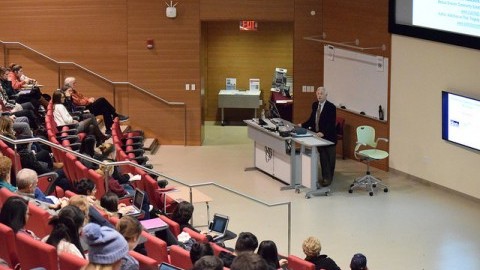Clearly, the self-doubt is of my own making. I started pursuing a minor in mathematics early on in my college career. Despite my appreciation for math and science, it was not in the stars for me to spend my life with them. I was drawn to the hands-on, multidisciplinary nature of planning and organizing. Still, I had a knack for numbers. Why leave behind that skill set if statistics is a key part in policy-making, data assessment and local economies?
Concepts like statistics, physics and computer science aren’t for everyone, and it would be tedious to force more general education requirements on the student body. But in the age of big data, cyber warfare and climate change, knowing at least the fundamental ideas behind a few of these is essential — at the very least, minoring in these subjects from the outside should not be taboo.
In an ideal world, I would write to actively encourage non-STEM majors to pursue these subjects on the side. Unfortunately, our academic system is not suitable for such a call to action. STEM classes are understandably competitive, making it hard to join these classes without interfering with the rigorous curriculum of full-time STEM major students. There are sometimes classes that feature higher-level thinking or applied studies condensed into a digestible course, especially in the array of statistics and biology courses offered. These classes, I would assume, are not favorable to the University since they do not necessarily promote major enrollment, making them a burden on the department. Overall, keeping the major realms distinct is convenient for students and the University.
Still, I wish it weren’t so. The divide between STEM and the world of social sciences can lead to a stigma that runs counter to the ideal of intellectual diversity. Students fear or resent the rigor or apparent lack thereof in the other while having little patience or time to contemplate the unique struggles present on the other side of academics. For one, I can’t help but feel “imposter syndrome” in STEM classes: Though not a person nor examination has discouraged me, I keep wondering if I’m supposed to be there.
That feeling is unjustified. I’ve completed the prerequisites to be in those classes just like everyone else. There are safeguards in place to reduce the risk of taking the seats of students who need those classes to graduate. And I’m not learning “more information than I need” — data analysis may yet be at the core of my future career. Everyone arrives at their degree from an angle true to them.
Rationalizations aside, we should all strive to be multidisciplinary. It’s vital that scientists of the future understand how their work intersects with policy and politics, just as much as it is vital that people focused on theory have a basic understanding of how the world works in practice.
My point is not that everyone should be forcing irrelevant classes down their throats for the sake of being multidisciplinary. Taking up space in classrooms without the intent to put effort into them will only hurt the students most passionate about their area of study. Plus, I’m no fan of biology, so I understand when I hear people proclaim their frustration over having to take a calculus class. Students should only have to choose classes beyond their requirements purposefully.
Rather, I believe people from all majors have the ability to explore subjects they have an interest in, even if it takes them out of their comfort zones. It should be socially and academically acceptable for people working in fields that are impacted by STEM to be among students who are doing it for a living. A well-rounded campus better prepares our generation for the challenges ahead, and that process begins in the classroom.
James Mazarakis is a Collegian columnist and can be reached at [email protected].




















Joe • Oct 24, 2018 at 1:38 pm
Amy sure seems like a well adjusted and mature individual who is happy with her life choices as she comments on a college newspaper article written by college students for college students.
/s
Amy • Oct 23, 2018 at 7:24 pm
I have always taken courses outside my major..it’s called freedom.
This is just another sad collegian article that expounds a very simple and obvious point like it’s a brand new discovery and ties in with some aunt jenna, ask delilah, it’s okay you can do, be brave, let’s make the world a better place op-ed.